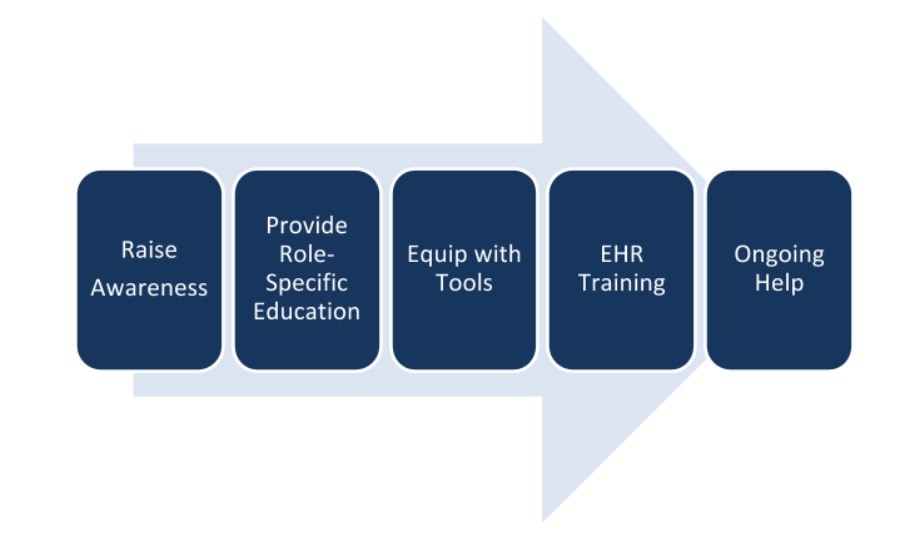There has been much talk about providing ICD-10 "training" to your practices and teams. What does that actually mean, though?
What do they really need to know to move to this "10" coding structure? What about the practice managers; what do they need to know and do? And when?
Having designed several healthcare IT training programs, I would argue that the transition to ICD-10 isn't really a traditional "training" initiative. Your teams aren't new to coding; they already know how to do their jobs. The transition to ICD-10 is about the "delta" – tell me what's changed and what I need to do now!
I'm not recommending endless hours of classroom training or watching canned videos on the history of coding. What am I recommending is a simple path with key components to transition your teams to ICD-10:

- Awareness: There continues to be much confusion around ICD-10. Start by addressing some common questions and misconceptions: What does it mean for me? Will the October 1 deadline really hold? What are the top five things that we, as a practice, can start now? What do we do after October 1? What are our key milestones? What's next? Then take some "baby steps" to start your transition: Convert your top twenty codes, meet with your payors and vendors; begin to plan your ICD-10 transition project; budget (time, money, and resources) accordingly through January 31, 2016.
- Role-Specific Education: Now that we are all aware of what this ICD-10 transition really looks like, it's time to take a deeper dive by role: Providers, practice / project managers, billing, coding and claims professionals. Start your providers off by performing chart reviews and converting their most commonly used codes. Practice managers and ICD-10 project managers should be knee-deep in project planning, including budgeting, timelines, vendor management and testing. Billing and coding folks should begin a review of the new features with ICD-10, guideline comparisons and the major differences between ICD-9 and 10.
- Tools: You've made your teams aware of the ICD-10 transition and clarified any misconceptions. Oh, and you've reminded them that the October 1, 2015, date is set in solid cement. You've told them what they have to do to prepare (e.g., planning, converting codes, etc.). But, how? Using what? Providing the right, trusted tools – such as ICD-10-specific project planning software for your practice and project managers; robust code translators for your providers, etc. – is the "rubber- meeting-the-road" piece of the successful equation. Overlooking this is equivalent to having blue prints to build a new home, without any of the tools to do so. And don't take the easy way out; there are no simple, free, direct and thorough code translators. But there are robust tools that can help.
- EHR Training: Finally! Training! After your electronic health record (EHR) has gone through testing and, most likely, an upgrade – and tested again – it's time to provide some level of "delta" training: What's changed as a result of the upgrade / transition to ICD-10? Have my workflows changed as well? Are there new, changed reports? I doubt this EHR training would be a significant initiative and most likely can be achieved through interactive eLearning – as long as the eLearning modules match your specific build and workflows.
- Where do I go for help?! This is the most important piece of the equation. After the awareness, education and training are done and we're live in October 2015, now what? What if I've forgotten or get stuck? Have a cost-effective, user-driven and easily-updatable resource (no, not calling the help desk) to answer the multitude of questions that will come up and to address changes? Repackage your education and training tools into bite-sized snippets for topic-specific help. Don't recreate; reuse and repackage for just-in-time performance support.
Tony Onorad is the CEO and founder of OnoradSolutions, which specializes in providing innovative training, process improvement, and change management solutions for healthcare IT clients. He also provides ICD-10 awareness, training, and project planning consulting services to a variety of clients and is a partner of ICD-10 Coach, a leader in ICD-10 transition services. He may be conacted at TonyOnorad@OnoradSolutions.com or 925-819-0423.
The views, opinions and positions expressed within these guest posts are those of the author alone and do not represent those of Becker's Hospital Review/Becker's Healthcare. The accuracy, completeness and validity of any statements made within this article are not guaranteed. We accept no liability for any errors, omissions or representations. The copyright of this content belongs to the author and any liability with regards to infringement of intellectual property rights remains with them.


